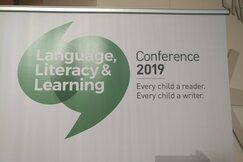
I came back to school with a wealth of new insights, a library shelf worth of recent research to read and digest, and a great extension of the professional network of people that I share ideas with online. Upon reflection, here are my five main takeaways from my time in Perth.
1. Educators and parents ignore the body of solid research about how kids learn and develop at their own risk (and that of their students and children). Modern technology has given us the tools to understand how information is processed in the brain, and where and how different cerebral functions have an impact on learning. Considering that written language is a relatively recent cultural innovation in human development. It can be understood that the ability to read expertly (decode language and understand its meaning and context) depends upon adapting parts of the brain that were never intended for that purpose. One of the other speakers at the conference who is a recognized world-leader in understanding this field is Paris-based, Stanislas Dehaene who is a leading researcher about the cognitive neuroscience of language and number processing in the human brain. He delves deeply into this area in his book: Reading in the Brain. It is his contention that:
Parents and educators must have a better understanding of what reading changes in a child's brain. Children's visual and language areas constitute an extraordinary machine that education recycles into an expert reading device. [There is no question that] increased knowledge of these circuits will greatly simplify the teacher's task.
To be honest, after reading his research and speaking with him about it, I am convinced that he is right and that his findings can push us in the right direction. How simple it will be is a totally different discussion!
2. A systematic and explicit early teaching of the correspondence between letters and speech sounds is of great benefit to all children learning to read. It has become painfully clear that fads such as "whole language" or "reading recovery" are inefficient and often completely ineffective methods of teaching reading. Teaching by using a sequential phonetic approach offers the students the tools necessary to unlock the door to reading acquisition. As the student reads, he/she can apply the rules of our language and analyze what is written for greater understanding. This Synthetic Phonics approach (such as we use through our Orton-Gillingham trained tutors) is the learning of phonemes (the smallest unit of sound) and their corresponding graphemes (the written symbol for each phoneme) and, combined with Analytic Phonics (whole-word approach) which breaks down a whole word to its parts with the help of decoding, are all essential components of learning to read and correspond perfectly to current brain research.
3. It is important to remember that the issue in reading is not language acquisition. Almost all of our students approach reading with a rich vocabulary and understanding of meaning and syntax built in through years of talking and listening. Reading is just the process of establishing a visual interface between the symbolic representations of language on a page or screen and the massive database of words and phrases that are already imprinted in our long-term memories. As a result, the debate between coding and comprehension is a false dichotomy. They are not an either/or situation. Written language comprehension is simply the matching of decoding skills with existing spoken language comprehension. Expert reading is mostly a function of processing speed.
4. The acquisition of math skills follows many of the same patterns and pathways that the mastery and manipulation of sounds, words and language do. Daniel Ansari is a professor of psychology and neuroscience at Western University in London, Ontario. Part of his research focuses on working out which brain regions are involved in our ability to calculate. How is brain activation during calculation affected by the particular arithmetic operation being performed (e.g. do different brain regions subserve subtraction and multiplication)? And, does the type of problem-solving strategy result in the use of different brain networks? he is looking for answers to these questions in search for a better understanding of how the brain enables us to become mathematically fluent. What his research has determined is that the early acquisition of numeracy skills (number recognition and value, ordination, place value, etc.) is a great predictor of future math fluency. Jumping too early into computations, without mastering the basics, leaves students perpetually "behind" as maths become more complex.
5. There is no, "one right approach" for every student. (Spoiler alert, I already knew this!). In UBC professor Linda Siegel's book Not Stupid, Not Lazy: Understanding Dyslexia and Other Learning Disabilities she cites the excellent work being done in early literacy by the North Vancouver School District in the last decade. However, as she notes, even with a comprehensive approach that saw almost 90% of the general school population hit expected literacy levels by Grade 5, the results for students with learning disabilities still hovered around the 20% level. One thing became very clear as I met with educators from Australia and South-East Asia was there was no alternative to face to face, one on one work with students as a path to expert reading. Forget about the gimmicking programmes, and quick fixes, learning to read is a science and requires steady, repetitive work.
So, in the final analysis, the one real "revelation" that came out of my week on the other side of the world is that while research, analysis, and the anecdotal experiences of other great educators provide great insights and learnings, there is no substitute for roll up your sleeves work, day after day, to ensure real success for our kids.


 RSS Feed
RSS Feed
